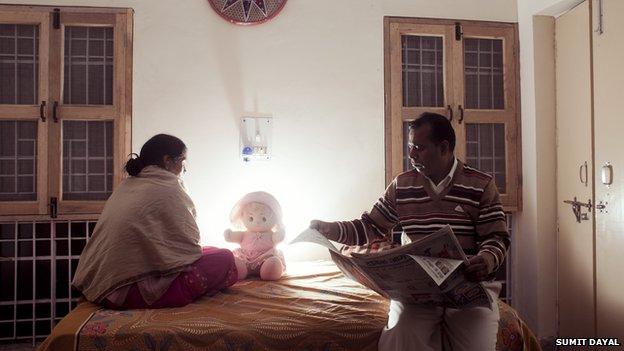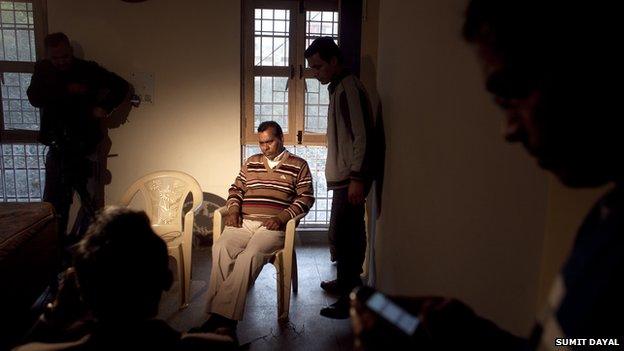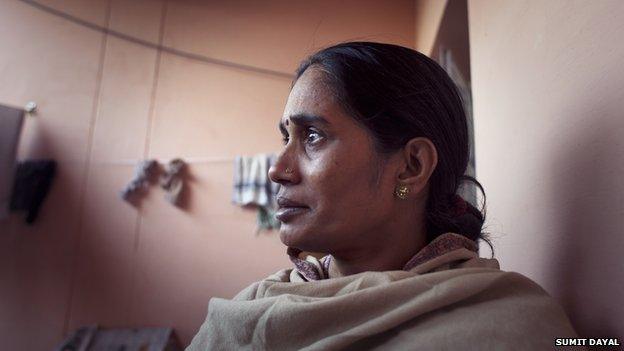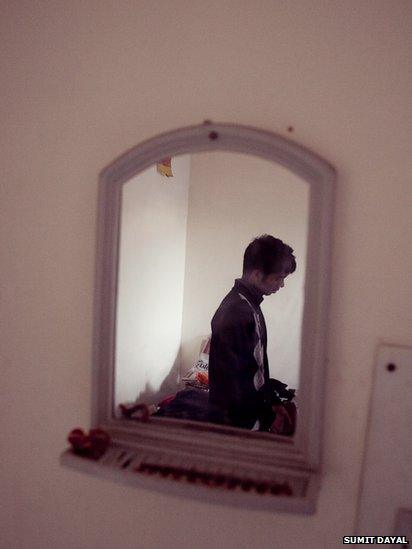How life has changed for Delhi rape victim's family
- Published

The victim's family has moved to a new apartment provided by the authorities
A 23-year-old Indian student was fatally gang-raped inside a bus in the capital, Delhi last December. The attack caused international outrage and prompted India to introduce stringent anti-rape laws. A court sentenced her attackers to death this September. The BBC's Soutik Biswas met the family of the victim to find out how life had changed for them after her death.
Her father had returned home tetchy and tired after a gruelling 16-hour working day at Delhi's international airport on the night of 16 December 2012.
He received a call from a breathless policeman an hour before midnight that his daughter had met with an accident and had been taken to hospital. An hour later, doctors told him she had been gang raped on a moving bus by a group of men. Two weeks later, she died in a hospital in Singapore.
Wake up India, she's dead, screamed a newspaper headline, as India exploded in anger and outrage.
Life had changed in an instant for the woman's family.
'Poverty was better'
A year on from the attack, the family has moved into a two-room apartment gifted by the government in a thriving suburb of Delhi. It's dank and the stairwell lights often don't work at night, but it's still a vast improvement over their crumbling brick home in a tumble-down neighbourhood where monsoon rains flooded the rooms.
The private company that runs the city's international airport has provided the 54-year-old father with a new job making entry passes with regular hours and a wage of 20,000 rupees ($326; £200) a month.
It's a far cry from his backbreaking job handling baggage at the airport: he would work double shifts for a paltry 6,620 rupees ($107; £66) a month.

The victim's father faces a media scrum on the eve of the first anniversary of his daughter's death
The family's two sons, aged 21 and 17 - their sister was the eldest at 23 when she died - now go to an upmarket engineering college and a prominent city school, their fees paid by the government. The elder son is studying to become a computer scientist; the younger one is planning to become a doctor.
Then there's the unrelenting public gaze: the parents have been on primetime TV news and have attended award ceremonies to remember their dead daughter, and everybody in the neighbourhood knows that the "victim's family" lives here.
Strewn around the sparse apartment, there's evidence of modest prosperity: a small TV on a rickety table, a cheap washing machine, a gas cylinder, a new water heater in the bathroom.
"But sometimes I feel," the father tells me, "poverty was better for us. We slept well. We were happier. Today, we have everything, but yet nothing. Without our daughter our world has turned colourless".
"You know, I used to say, my daughter is the engine of the family. All of us were like bogies [carriages] yoked to the engine."
In his cream trousers and striped brown sweater, the father sits on a plastic chair, his head hunched, his eyes gazing at the floor. He has calloused hands of a man who has done hard manual labour: first, as a worker in a small factory making pressure cookers and then a overworked baggage loader.
Public gaze
He has worked hard to get his children educated, doing double shifts, selling a small plot of family land for 200,000 rupees ($3,224; £1,995) to enable his daughter to enrol in a four-year physiotherapy course which she had completed.
His phone keeps ringing incessantly, usually from journalists wanting to visit the family. His 46-year-old wife, the victim's mother, is wearing a bright pink chiffon sari and staring vacantly at a noisy media scrum building up at the door. The younger son fidgets with his phone on the verandah outside. A pale winter sun struggles to creep into the cold room.
They have brought a few of her possessions to their new home.

The victim's mother says she suffers from sleeplessness and is often sick
Her favourite pink doll is one. "Let's keep my daughter on the bed with us for the picture," the mother tells the photographer.
A couple of her books on neurology and neuroscience and human anatomy, both photocopied because the family couldn't afford to buy the expensive originals, have made it to the new apartment. But most of her belongings, her brother says, lie packed in a trunk in the old house, where an aunt stays - "her clothes, her notes, her dreams".
It's understandable. Grief doesn't make living easy.
Grief arrives in paroxysms that make the mother break out in cold sweats at night when she thinks of what her daughter went through at the hands of her attackers. "I begin choking sometimes," she says.
Grief arrives in waves every Sunday when she breaks down and cries because it is a day the family enjoyed most together, but also the fateful day she went to see her first English movie - Life of Pi - with a friend and never returned home. "Sundays are the hardest. I feel she's moving around us," her mother says.
She says she doesn't step out of the house much, and hasn't bought anything for herself since her daughter's death. Sleeplessness has made her sick. An ear infection needed minor surgery, but she's still suffering.
'A dream'
All that the family is really left with are her memories, the good and the bad. And a dream.
Her mother says she remembers how her daughter would talk the night away with her father and her brothers about their hopes for the future. They remember her final hours in the intensive care unit after doctors gave up hope: her brother says the family stood around her bed as "her heart beat slowed, the alarm bells went ringing and the monitors flat-lined".
Her father says he has a dream often.

The victim's brother is studying to become a doctor
"She comes in one dream, you know," he says, his eyes gleaming suddenly, looking at me. "We are in a hotel in a town to see her. She visits us. She stands near me and asks me whether I need money. I tell her, I don't need any money, just take care of your brothers. And then she vanishes.
"She would always tell me not to worry about money. That she would take care of the family."
That is what poverty does to you, the father says. Think about money all the time. Think about whether you have enough money in your pocket to take your daughter's body home.
"When I went to the hospital on the night of 16 December with a friend the doctors told me my daughter would not possibly live beyond a couple of hours. My first thought was how will I take her body home?" he says.
"Between the two of us we had 1,000 rupees ($16; £9). Would it be enough to pay for the medicines and the ambulance? She survived the night. Next day a politician came and paid me 25,000 rupees ($405; £250). I felt better. At least I had the money to take her body home if she died. This is what poverty does to you."
On the first anniversary of her death, the family will hold a small memorial service. They also plan to launch a trust with donations to feed and educate poor children, to begin with.
"We just want to keep her memory alive as long as it's possible. I know one day people will forget her. But they will remember her death led to changes - changes in the anti-rape laws, a change in consciousness," her father says.
"Women are speaking up against harassment and violence now. There is some fear of the law.
"That is my daughter's contribution, isn't it?"